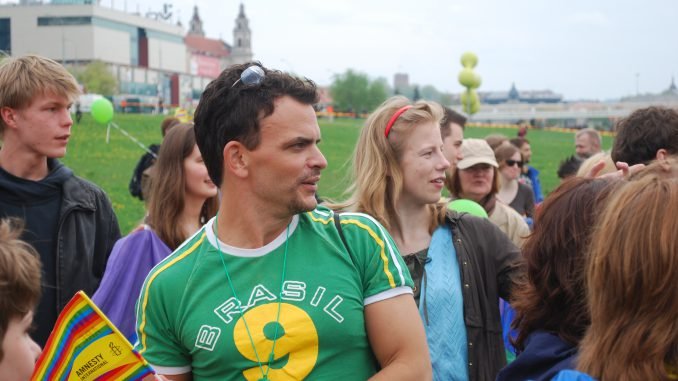
He, like other Lithuanian dissidents of that time — Nijolė Sadūnaitė, Antanas Terleckas, Vytautas Bogušis, Father Julius Sasnauskas and others — were a source of hope and inspiration for young Lithuanians living abroad, and we defended their freedom with one voice in meetings with religious officials in the West, with members of the US Congress and parliaments of the free world, and in demonstrations in front of Soviet embassies.
For a young person then it was all so clear: Svarinskas’ struggle was our struggle. His was a fight for a democratic Lithuania, one that not only guaranteed freedom of conscience, but also respect for all citizens of that democratic Lithuania.
When it was still unthinkable to dream of an independence movement, and when some of Lithuania’s current politicians were still fighting to make their careers within the communist system, Alfonsas Svarinskas was one of the few who found the strength within themselves to keep hope alive.
But twenty years later, Father Svarinskas labelled the Lithuanian LGBT community, including me, traitors to Lithuania and sexual deviants, not missing the opportunity to compare us to pedophiles. He continued his fight against us and our supporters to the end of his days, and not without the support from others. Others chimed in: politicians, church officials, and other former dissidents like current Member of Parliament Petras Gražulis, whose image on protest posters was carried in front of many Soviet embassies back in the day by many young émigré Lithuanians — straight or gay.
Sadly, on the eve of the first Baltic Pride march in 2010 in Vilnius, Gražulis, also a former dissident, found it necessary to appear on a television programme with a shot gun in his hands — apparently the proper tool to deal with participants in a peaceful march organized by fellow Lithuanian citizens. And in 2013, images of Gražulis were held aloft not by diaspora Lithuanians, but by proponents of hate.
After honourable beginnings, the message to Lithuania sent by Svarinskas and Gražulis had transformed into something else: everything that is alien to me must be eradicated. Lithuania can only be a home to some. Sadly, it’s becoming clear that, in the end, we haven’t been fighting for the same Lithuania after all.
Fortunately, Lithuanian society is becoming more open and more tolerant. The LGBT pride march in 2013, unlike the one three years earlier, took place in the open, on the city’s central street. Despite the efforts of the self-proclaimed innovative and liberal mayor of Vilnius, we were able to leave the reservation that had protected the march in 2010. And it is heart-warming to see that the younger generation of Lithuanians sees the hysterical outbursts by the likes of Svarinskas and Gražulis as more of a source for Facebook memes than a serious call to arms.
Still, it’s all somehow so sad. It is beyond painful to see how such figures, who by all accounts should be occupying a special, honourable place in the country’s history, have fallen to the influences of conspiracy theories, disinformation and pure hatred.
Or maybe it’s simpler than that: time spent behind bars in Soviet prisons or in KGB basements wreaked its own, irreparable, damage. Even after hearing a priest hurl the most disgusting insults at fellow citizens of Lithuania, I don’t want to let go of those memories when that priest, and other dissidents, were beacons of light for young Lithuanians abroad, not prophets of darkness. And I don’t want to believe that they fail to comprehend that it is the hatred they continuously spout that is partially responsible for the departure of so many young Lithuanians — from the country, or from life itself.
I am only left with a sincere hope that, wherever the soul of Father Svarinskas has found haven, the mistakes he has made will be gently and lovingly explained to him. Perhaps he will be met at the gates of his eternal rest by a young Lithuanian lesbian, say, who’ll invite him to sit under a tree, to quietly and calmly talk about the diverse world that God created. About how young Lithuanians who took their own lives could have benefited from a more merciful and welcoming earthly church. And about how beautifully children are being raised by caring gay and lesbian families, some of whom I have had the great fortune to get to know.
For all your days spent in Soviet prison camps, Father, all of my respect. May you now rest in peace. I wish you many a thoughtful conversation there.

Be the first to comment